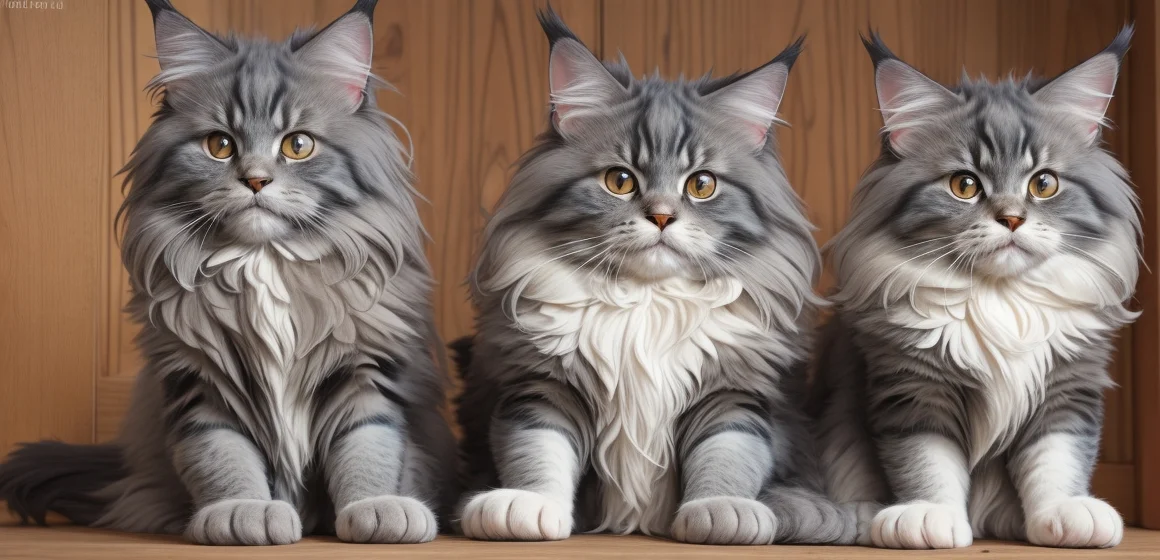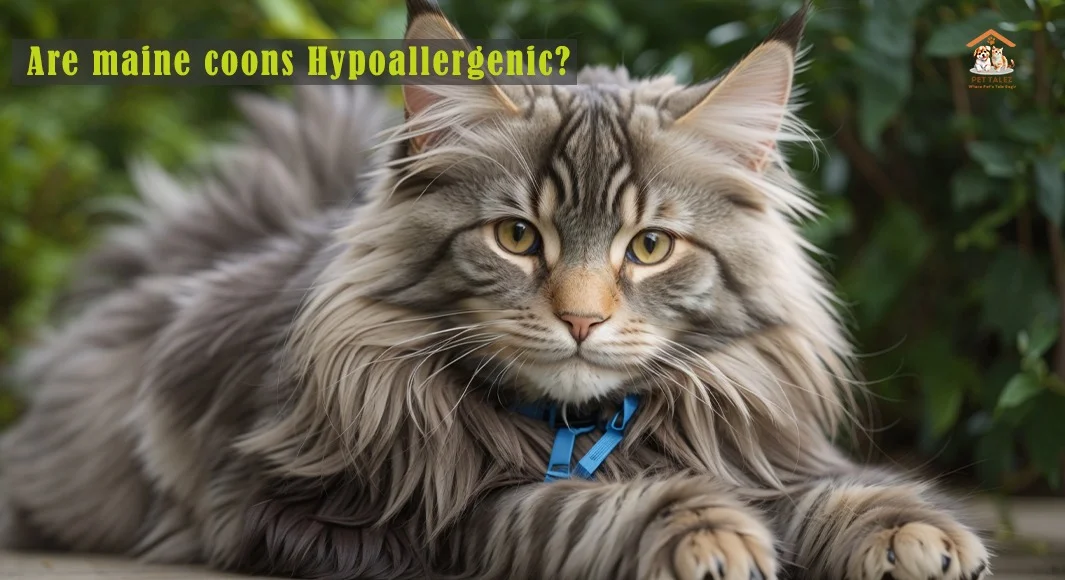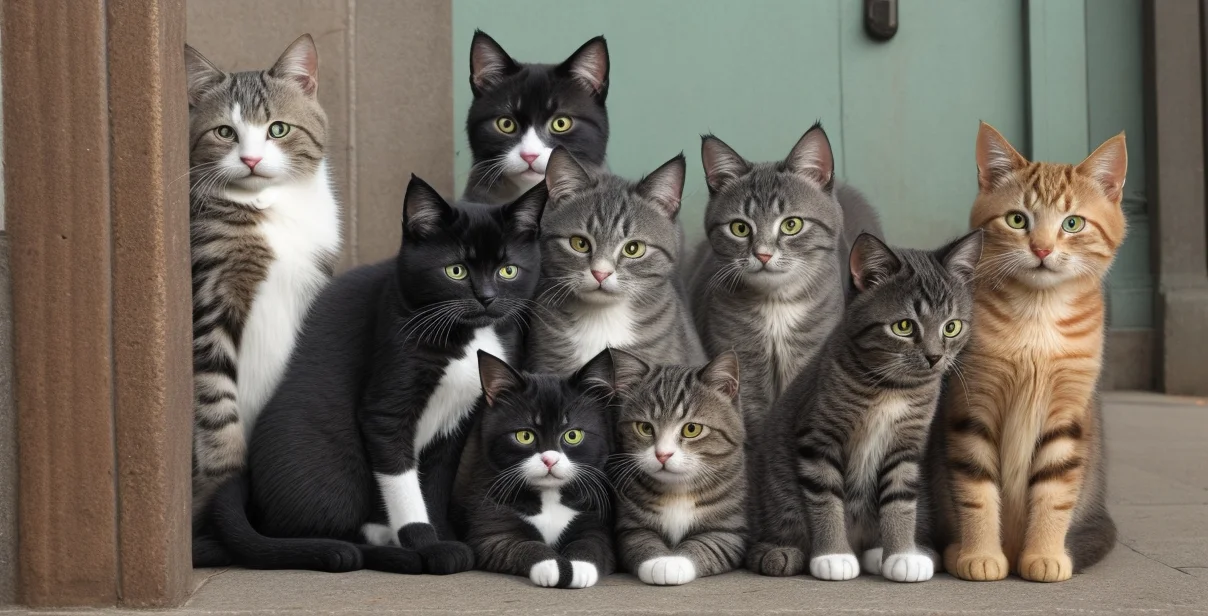What Makes a Cat Hypoallergenic?
Maine Coon Cats: A Brief Overview

Distinctive Physical Traits:
Impressive Size:
One of the most striking features of the Maine Coon breed is its substantial size. These cats boast a robust and muscular physique, exuding an impressive presence.
Tufted Ears:
Maine Coon cats get attention for their tufted ears. They have special ear tufts that add to their unique look.
Bushy Tails:
Their voluminous and bushy tails add to their majestic allure, often becoming a notable hallmark of the Maine Coon breed.
Temperament and Personality:
Friendly Disposition:
Maine Coons are celebrated for their friendly nature. Maine coons tend to be friendly, making them a delightful addition to any household.
Affectionate Nature:
Maine Coon cats are famous for being loving. They like to make strong connections with their human friends, showing lots of affection and loyalty.
Popular Choice:
Maine Coon cats are a top pick for cat lovers because they’re cute and friendly. Lots of families like having them around.
First, look at their unique traits to understand why they’re so great. They’re big, have unique looks, and are super loving. These make them fantastic pets for anyone who wants a loyal and friendly cat.
Now, let’s check out if they’re hypoallergenic!
Are Maine Coons Hypoallergenic?

Understanding Maine Coons and Allergens:
Allergenic Proteins: Maine Coons, akin to many cat breeds, emit the Fel d 1 protein. This specific protein in their saliva and skin cells can trigger allergic responses in sensitive individuals.
The potency of Allergens: While Maine Coons produce a reduced amount of allergens compared to certain other breeds, the presence of Fel d 1 allergen is substantial enough to cause allergies in those susceptible to cat allergens.
Grooming and Allergen Management:
Minimizing Allergens: Regular grooming practices and periodic bathing of Maine Coons can aid in mitigating the spread of allergens. This reduces loose fur and dander-carrying allergens.
Individual Sensitivity: It’s crucial to recognize that individual reactions to cat allergens differ. Some people might have fewer allergic reactions near Maine Coon cats, but others could still be sensitive to their allergens.
What Causes Cat Allergies? Common Allergenic Triggers in Cats

Various elements present in cats can trigger allergies for individuals sensitive to allergens. Here are some common allergenic triggers in cats:
Fel d 1 Protein:
Saliva and Skin Cells: This protein comes from a cat’s oil glands and is in their spit. When cats groom, it gets on their skin and causes allergies.
Cat Dander:
Skin Flakes: Maine Coon cats shed tiny skin flakes called dander. This dander carries the Fel d1 protein and goes into the air, causing allergies in sensitive people.
Urine:
Allergens in Urine: When cat urine dries, it can contain allergens that, when airborne, contribute to allergic responses.
Allergen Dissemination:
Spread and Distribution: Cats spread allergens by grooming, shedding, or leaving proteins on surfaces, putting them in the environment.
Immune System Reaction:
Individuals with allergies react to these proteins as harmful invaders. This prompts the immune system to release histamines and other chemicals, causing symptoms like sneezing, itching, watery eyes, or respiratory issues.
Managing Cat Allergies:
To help with allergies, do these: groom the cat, clean the house, make allergen-free spots, and use air purifiers with HEPA filters. This helps lessen allergens in the air and makes allergies better.
Common Allergy Symptoms
Allergic reactions to cats, including Maine Coons, can manifest in a variety of ways. Here are some common symptoms:
- Sneezing: Allergens can irritate the nasal passages, leading to frequent sneezing.
- Itchy or Watery Eyes: Allergens in the air can also affect the eyes, causing itching and watering.
- Skin Irritations: Skin rashes or hives may appear after contact with cat dander or hair.
- Congestion: Inhaling allergenic particles can cause nasal congestion and difficulty breathing, especially for asthma patients.
- Coughing: Allergens can trigger coughing and respiratory discomfort.
- Fatigue: Chronic allergies can lead to fatigue due to disrupted sleep from symptoms like congestion and itching.
Understanding these symptoms can help you identify and manage allergies more effectively.
Tips for Living with Allergies and Maine Coon Cats

Living with allergies when you have a Maine Coon kitten can be hard, but there are ways to make it better. Here are some tips for people who are sensitive to cat allergens:
Allergen-Reducing Products:
Explore allergen-reducing products specifically designed for pet owners. These may include allergen-reducing sprays, wipes, and surface cleaners. Such products can help manage allergens on surfaces, furniture, and your cat’s belongings.
Control Cat Allergens:
Consider solutions like cat allergen-neutralizing sprays or wipes to reduce the allergenic proteins present in your Maine Coon’s coat. While these products may not eliminate allergens, they can reduce their impact.
Minimize Cat Contact:
It’s tough to limit contact with your Maine Coon if they’re affectionate, but setting boundaries helps. Make areas where sensitive people spend time off-limits. Avoid close contact, like snuggling, especially before bedtime.
High-Quality Cat Food:
Opt for high-quality cat food that promotes healthy skin and coat. A well-balanced diet can help reduce excessive shedding and promote a glossy, healthy coat, potentially decreasing allergen levels.
Pet Dander Sprays:
Sprays can be applied to your cat’s long fur to help minimize allergen levels. Consult with your veterinarian or an allergist for recommendations on effective products.
Use a HEPA Vacuum Cleaner:
Apart from using a vacuum with a HEPA filter, use a HEPA vacuum cleaner to clean your home well. These special vacuums catch tiny particles like allergens, stopping them from returning to the air.
Regular Bedding Cleaning:
Wash your Maine Coon’s bedding regularly to remove any allergens that might accumulate. Ensure you use hypoallergenic detergent to minimize your cat’s skin irritation risk.
Cat Allergen-Blocking Products:
Some products, such as allergen-blocking pillowcases and mattress covers, can help reduce exposure to cat allergens while you sleep, improving the quality of your rest.
Allergy-Friendly Flooring:
If you’re considering renovations or moving to a new home, choose hard flooring over carpet, such as wood or tile. Carpets tend to trap allergens, while hard flooring is easier to clean and maintain.
Consult with an Allergist:
Regularly consult an allergist to monitor your allergies and discuss any changes in symptoms. Your allergist can adjust your treatment plan accordingly.
Crate Training:
If you need to keep your Maine Coon cat confined for any reason, consider crate training. This provides a safe space for your cat and helps limit allergen exposure in your home.
Educational Resources:
Learn about allergies and how to care for your cat by reading books, articles, and websites. Understanding allergies and Maine Coon cats helps you make smart choices.
To manage allergies better, try these strategies. Keep up with them to make yourself and your Maine Coon cat more comfortable. You can live with allergies and a Maine Coon cat by being careful and managing allergens. You can live with allergies and a Maine Coon cat. Here’s how: groom your cat often, clean your home, make allergen-free spots, and talk to doctors. This helps lessen allergic reactions and makes a happy environment while enjoying your Maine Coon cat.
Should People With Cat Allergies Stay Away from Maine Coon Cats?
Popular Hypoallergenic Cats
While no cat breed is entirely allergen-free, certain breeds are often considered hypoallergenic due to their potential to produce fewer allergens. Common cat breeds recognized for their hypoallergenic traits include:
Balinese:
These cats have long, silky fur and might make fewer allergens, which can suit some people with allergies.
Russian Blue:
The Russian Blue breed is believed to generate fewer allergens, thanks to their shorter, dense, and plush blue-grey coat.
Sphynx:
Even though Sphynx cats look hairless, they still make allergens. But they have no fur, so they might not spread as much cat dander, causing fewer allergic reactions.
Siberian:
Siberian cats have fewer allergies, so people think they’re hypoallergenic and might suit those with allergies.
Knowing about these hypoallergenic cats can help allergic people find a cat that might not cause a reaction. But reactions can be different, so it’s smart to spend time with a cat before deciding.
Conclusion
FAQs
Q. Can Maine Coon cats be suitable for people with allergies?
A. Maine Coon cats are not hypoallergenic, but with careful grooming and home allergen-reduction strategies, they can be suitable for some individuals with allergies.
Q. What makes cat allergens a concern for allergic individuals?
A. Cat allergens, present in a cat's skin cells, urine, and saliva, can become airborne and trigger allergic reactions in sensitive individuals.
Q. Are there any genuinely hypoallergenic cat breeds?
A. No cat breed is entirely hypoallergenic. While some breeds produce fewer allergens, none are completely allergen-free.
Q. How can I minimize allergic reactions when living with a Maine Coon?
A. To minimize allergic reactions, consider using HEPA filters, regular grooming, and maintaining a clean home to reduce allergen levels.
Q. Are Maine Coons good pets for families and individuals?
A. Yes, Maine Coons are famous for being friendly and pleasant. They are great pets for families and people who want a loving and interactive friend.
